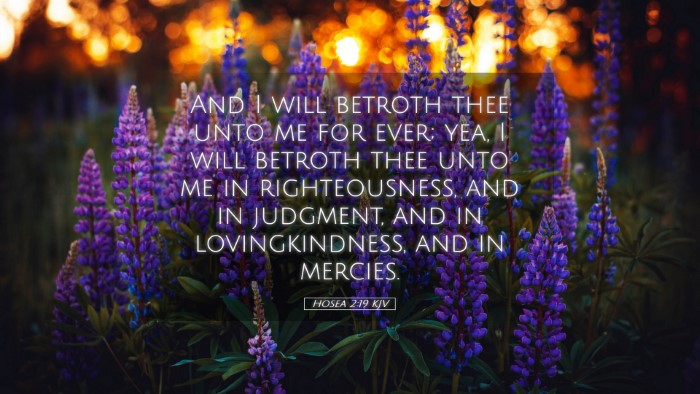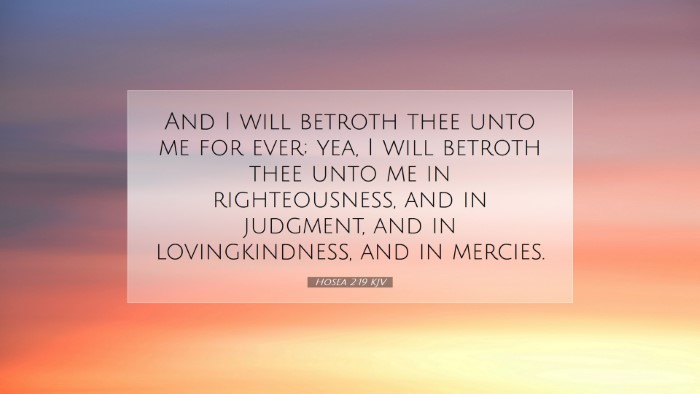Old Testament
Genesis Exodus Leviticus Numbers Deuteronomy Joshua Judges Ruth 1 Samuel 2 Samuel 1 Kings 2 Kings 1 Chronicles 2 Chronicles Ezra Nehemiah Esther Job Psalms Proverbs Ecclesiastes Song of Solomon Isaiah Jeremiah Lamentations Ezekiel Daniel Hosea Joel Amos Obadiah Jonah Micah Nahum Habakkuk Zephaniah Haggai Zechariah MalachiHosea 2:19
Hosea 2:19 KJV
And I will betroth thee unto me for ever; yea, I will betroth thee unto me in righteousness, and in judgment, and in lovingkindness, and in mercies.
Hosea 2:19 Bible Commentary
Commentary on Hosea 2:19
Hosea 2:19 states: "And I will betroth thee unto me for ever; yea, I will betroth thee unto me in righteousness, and in judgment, and in lovingkindness, and in mercies." This verse is pivotal in understanding the character of God’s covenant relationship with His people.
Introduction
The Book of Hosea presents a powerful metaphor of love, relationship, and restoration. Hosea, a prophet whose personal life reflected the tumultuous relationship between God and Israel, is tasked with delivering messages of warning and hope. In this verse, we witness God's promise of a renewed covenant with His people.
The Nature of Betrothal
Betrothal is a significant theme in this passage. The mention of "betrothing" connotes a bond that is both strong and enduring. Matthew Henry notes that God's declaration is not just a temporary union but an everlasting commitment. This indicates God's unwavering fidelity, despite Israel's unfaithfulness.
Relational Dynamics
- Commitment: The term suggests a legal and sacred bond, emphasizing that God is fully committed to His covenant people.
- Intimacy: Just as a marriage signifies deep interpersonal closeness, so does God’s relationship with Israel.
The Qualities of the Covenant
In this verse, God describes the qualities that define this betrothal, namely righteousness, judgment, lovingkindness, and mercies.
- Righteousness: Albert Barnes interprets this as God’s moral character being the foundation of His covenant. It signifies His commitment to justice and equity.
- Judgment: This can refer to God's governance over His people, ensuring that they are held accountable. Clarke emphasizes that judgment is coupled with mercy, portraying God as just yet compassionate.
- Lovingkindness: This characteristic reflects God’s steadfast love. Henry highlights that God's lovingkindness involves His loyal love and grace despite Israel's waywardness.
- Mercies: The expression of God’s compassion and readiness to forgive. Barnes points out that this denotes an abundance of grace poured upon the people, illustrating God's nature as a redeemer.
Theological Implications
This verse encapsulates the essence of God’s covenant with Israel and extends to all believers today. The call to intimacy and partnership reflects broader biblical themes of redemption and restoration. The character traits mentioned are not only pertinent to God's dealings with ancient Israel but serve as a model for contemporary Christian living.
Application for Today
- Covenantal Relationship: Believers are invited into a covenant relationship with God, characterized by faithfulness and mutual commitment.
- Righteous Living: The call to embody righteousness requires Christians to engage in ethical living, reflecting God's nature in their daily choices.
- Practicing Lovingkindness: Emphasizing the importance of showing steadfast love and compassion towards others, mirroring God's dealings with humanity.
- Understanding Judgment through Grace: Acknowledging that while God is a God of justice, He tempers His judgments with grace and mercy, which should encourage us to extend the same to others.
Conclusion
Hosea 2:19 serves as a profound reminder of God's commitment to His people and the nature of the relationship He desires with humanity. It challenges the reader to reflect on the covenantal love of God, to recognize the qualities that should define their interactions with Him and with others, and to appreciate the depth of God's enduring promise.


